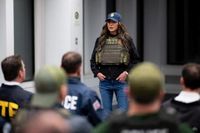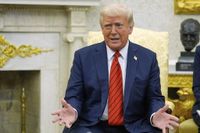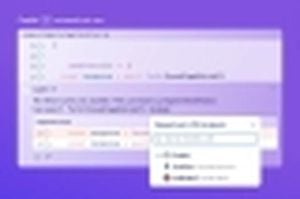In a significant announcement on or by April 11, 2025, Department of Homeland Security Secretary Kristi Noem declared that all noncitizens must register with the U.S. Citizenship and Immigration Services, "regardless of status." This directive marks a pivotal shift in the U.S. immigration policy landscape, reflecting ongoing concerns regarding border control and immigration enforcement.
As the Trump administration continues to grapple with immigration issues, a report from top officials is expected to reveal recommendations on whether to invoke the Insurrection Act in response to these concerns. The report, due on Sunday, April 20, 2025, follows President Donald Trump’s January executive order declaring a border emergency. This order mandated a joint assessment from Defense Secretary Pete Hegseth and DHS Secretary Noem within 90 days, focusing on the conditions at the southern border and potential actions to regain operational control.
Trump has made curbing illegal immigration a cornerstone of his presidency, emphasizing the need for strict measures to manage the flow of migrants. The Insurrection Act of 1807, a rarely utilized statute that allows for the deployment of active-duty military personnel for law enforcement within the United States, is at the center of this discussion. Historically, this act has been invoked in critical situations, including during the Civil War and in response to civil rights crises.
Former Assistant Attorney General for Virginia Gene Rossi commented on the potential invocation of the act, suggesting that Trump, emboldened by a second term, might consider it for immigration and other purposes. Rossi noted, "That these likely invocations, if any, will come from a convicted felon with his own January 6 insurrection tendencies means that we are entering '1984' territory that would make George Orwell pea-green with envy." This reference highlights the controversial nature of Trump's presidency and the implications of invoking such a significant legal measure.
The Insurrection Act has not been frequently used in modern history, with notable instances including President Abraham Lincoln's use during the Civil War and President Dwight D. Eisenhower's deployment of federal troops to enforce desegregation in Little Rock, Arkansas. The act's invocation could allow for military personnel to arrest migrants, a move that raises significant concerns among civil rights advocates and immigration experts.
Despite the administration's push for stricter measures, reports suggest that Hegseth and Noem are not expected to recommend invoking the Insurrection Act. According to CNN, the anticipated recommendation indicates that migrant crossings have significantly decreased, with numbers falling to under 300 per day compared to well over 1,000 in previous years. This decrease suggests that current levels of migration may be manageable without resorting to military intervention.
Officials have also expressed concerns that invoking the act could overwhelm existing detention capacities, further complicating an already strained immigration system. The DHS stated, "At the president's direction, the DHS and DOD are developing a joint report assessing the conditions at the U.S. southern border and recommending actions to achieve full operational control of the border." This statement underlines the administration's ongoing commitment to addressing immigration issues while navigating the complexities of enforcement.
The debate surrounding the Insurrection Act and immigration policy continues to evoke strong reactions from various stakeholders. Advocates for immigration reform argue that the focus should be on comprehensive solutions rather than military intervention, emphasizing the need for humane and effective policies that address the root causes of migration.
As the Trump administration prepares to receive this crucial report, the implications of its findings could have lasting effects on U.S. immigration policy and the broader political landscape. Observers are keenly watching to see how the administration will respond to the recommendations and whether it will pursue more aggressive measures in the face of changing migration patterns.
In summary, the announcement by Secretary Noem requiring noncitizens to register marks a significant development in immigration policy, coinciding with the administration's efforts to address border control through potential military measures. As the report on the Insurrection Act looms, the administration faces critical decisions that will shape the future of immigration enforcement in the United States.






